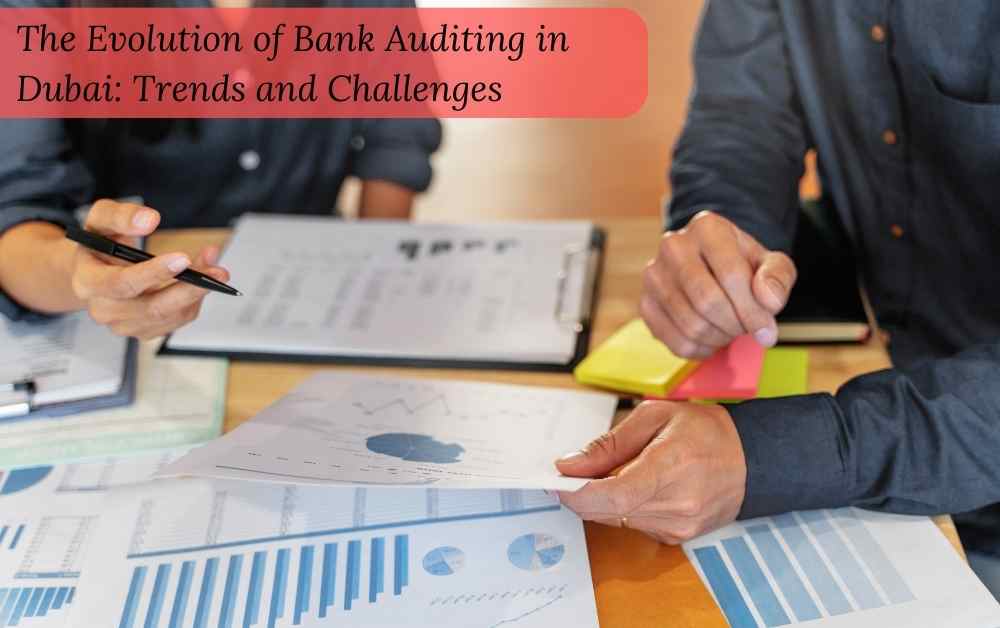Introduction
In the bustling financial epicenter of Dubai, the field of bank auditing has been experiencing a transformation. As this dynamic city continues to grow and adapt to the ever-evolving global financial landscape, so do the practices and trends in bank auditing. In this comprehensive exploration, we will embark on a journey through the evolution of bank auditors in Dubai, exploring the trends that have shaped this field and the challenges that auditors face in the modern era.
The Significance of Bank Auditing
Before we delve into the evolution, it’s essential to understand why bank auditing matters. At its core, bank auditing is the process of examining a bank’s financial records, transactions, and internal controls. Its primary objective is to ensure the accuracy and transparency of financial information and to provide assurance to stakeholders, including investors, regulators, and the public.
The Early Days of Bank Auditing
A Historical Perspective
Bank auditing in Dubai has a rich history that dates back to the early days of the city’s financial development. As Dubai began its journey as a global financial hub, auditing practices were relatively straightforward. Auditors focused on basic financial statement verification and compliance with regulatory requirements.
However, the historical perspective reveals that the role of auditors extended beyond mere financial verification. Auditors played a crucial role in instilling trust and confidence in Dubai’s emerging financial institutions. Their presence was a testament to the commitment to transparency and accountability in a rapidly evolving financial landscape.
The Role of Technology
The early auditors relied on manual processes and paper records. Transactions were documented by hand, and financial statements were painstakingly prepared. This labor-intensive approach to auditing required meticulous attention to detail.
The emergence of computer technology in the late 20th century revolutionized auditing practices. Auditors could now analyze vast amounts of data more efficiently, leading to increased accuracy and effectiveness in audits. The advent of computers also introduced the concept of data analytics, which would later become a significant trend in the field of bank auditing.
Trends Shaping Modern Bank Auditing
1. Data Analytics and Automation
In today’s digital age, data analytics and automation have become integral to bank auditing in Dubai. Auditors utilize advanced software to analyze large datasets quickly. This trend has improved the detection of irregularities and increased the efficiency of audits.
The Power of Data Analytics
Data analytics is a game-changer in the world of bank auditing. Auditors can now sift through vast volumes of financial data to identify patterns, anomalies, and potential risks. By harnessing the power of data analytics, auditors gain deeper insights into a bank’s financial health.
Advanced analytics tools can perform predictive analysis, helping auditors anticipate financial challenges and opportunities. This proactive approach enables auditors to provide valuable recommendations for financial institutions to strengthen their resilience.
Streamlining Audit Processes through Automation
Automation is another key trend in modern bank auditing. Routine audit procedures that once required manual effort are now automated, reducing the risk of human error and increasing audit efficiency.
For example, transaction testing, which involves verifying individual transactions for accuracy and compliance, can be automated. This automation not only accelerates the auditing process but also ensures a more comprehensive examination of transactions.
2. Cybersecurity Audits
With the rise of cyber threats, cybersecurity audits have become a prominent trend in bank auditing. Auditors assess a bank’s cybersecurity measures to ensure the protection of sensitive financial data. Dubai’s financial institutions must remain vigilant against cyber threats.
The Growing Significance of Cybersecurity Audits
In an era when cyberattacks can result in significant financial losses and reputational damage, cybersecurity audits are no longer optional; they are imperative. Auditors evaluate a bank’s cybersecurity policies, procedures, and infrastructure to identify vulnerabilities and weaknesses.
These audits encompass a wide range of cybersecurity aspects, including network security, data protection, access controls, and incident response plans. Auditors aim to ensure that banks are adequately prepared to defend against cyber threats and respond effectively in the event of a breach.
Adapting to Evolving Cyber Risks
One of the challenges auditors face in the realm of cybersecurity audits is the rapid evolution of cyber risks. Cybercriminals constantly adapt and develop new attack methods. Auditors must stay updated on emerging threats and cybersecurity best practices to provide relevant and effective audit assessments.
3. Environmental, Social, and Governance (ESG) Audits
ESG audits are gaining importance in Dubai’s banking sector. Auditors assess a bank’s adherence to environmental, social, and governance principles. This trend aligns with Dubai’s commitment to sustainability and responsible banking.
The ESG Imperative
Environmental, social, and governance factors have become central considerations for businesses and investors worldwide. In Dubai, a city with ambitious sustainability goals, ESG audits have taken on added significance.
Auditors evaluate a bank’s impact on the environment, its contributions to society, and its governance practices. This assessment goes beyond financial metrics and delves into a bank’s broader role in promoting sustainability and ethical business conduct.
Navigating the Complexity of ESG Audits
ESG audits are inherently complex. Unlike traditional financial audits, which deal with quantifiable financial data, ESG audits involve assessing qualitative factors. Auditors must develop frameworks and methodologies to assess a bank’s ESG performance accurately.
Additionally, ESG standards and reporting requirements vary globally. Auditors in Dubai must navigate these diverse standards while providing standardized and comparable ESG audit assessments.
4. Remote Auditing
The COVID-19 pandemic accelerated the adoption of remote auditing practices. Auditors can now conduct audits remotely, reducing the need for physical presence. This trend enhances audit flexibility and efficiency.
The Pandemic’s Impact on Auditing
The pandemic disrupted traditional audit practices, which often required auditors to be physically present at a bank’s premises. Lockdowns and travel restrictions made on-site auditing challenging, if not impossible.
In response, auditors adapted by leveraging technology to conduct remote audits. They remotely accessed bank systems, communicated with bank personnel, and reviewed digital documents and records. This shift to remote auditing allowed audits to continue despite the pandemic’s challenges.
The Benefits of Remote Auditing
Remote auditing offers several advantages. It reduces travel costs and time, making audits more cost-effective and efficient. Auditors can access a bank’s data and records in real-time, enabling them to perform continuous auditing and monitoring.
However, remote auditing also presents challenges, such as ensuring data security and maintaining effective communication with bank personnel. Auditors must strike a balance between the benefits of remote auditing and addressing its associated risks.
Challenges Faced by Bank Auditors
1. Cybersecurity Risks
As auditors delve into cybersecurity audits, they also face the challenge of understanding and assessing complex cyber risks. Staying updated on evolving cyber threats is crucial for effective auditing.
The Complex Landscape of Cybersecurity
Cyber threats are multifaceted, ranging from malware and phishing attacks to sophisticated hacking techniques. Auditors must possess a deep understanding of cybersecurity concepts and technologies to evaluate a bank’s defenses effectively.
Moreover, the cyber threat landscape is constantly evolving. New threats emerge, and cybercriminals continuously adapt their tactics. Auditors must remain vigilant and adaptable to stay ahead of cyber risks.
2. Data Privacy Regulations
Dubai has implemented stringent data privacy regulations, aligning with global data protection standards. Auditors must navigate these regulations while accessing and handling sensitive financial data.
Compliance with Data Privacy Laws
Dubai’s data privacy regulations, such as the Dubai Data Law, require financial institutions to safeguard customer data and ensure compliance with data protection principles. Auditors must verify that banks adhere to these regulations to protect customer privacy.
Failure to comply with data privacy laws can result in significant fines and reputational damage. Auditors play a critical role in ensuring that banks maintain compliance while conducting audits.
3. ESG Complexity
ESG audits involve assessing a bank’s impact on the environment, society, and governance. Understanding and evaluating these multifaceted factors pose a challenge for auditors.
The Multidimensional Nature of ESG
Environmental, social, and governance factors encompass a wide range of issues. Auditors must consider a bank’s environmental practices, social initiatives, diversity and inclusion efforts, and governance structures.
Each of these factors requires a nuanced assessment. Auditors must develop comprehensive audit methodologies that capture the complexity of ESG considerations.
4. Adapting to Technology
While technology has improved auditing, auditors must continuously adapt to new tools and software. Keeping their skills up to date is essential in this technology-driven era.
Staying Current with Technology
Auditors need to stay ahead of technological advancements to remain effective in their roles. This includes proficiency in data analytics tools, cybersecurity technologies, and remote auditing platforms.
Continuous professional development and training are essential for auditors to acquire the knowledge and skills needed to leverage technology effectively in their audits.
The Future of Bank Auditing in Dubai
1. AI and Machine Learning Integration
The integration of artificial intelligence (AI) and machine learning is expected to further revolutionize bank auditing. These technologies will enhance data analysis and predictive auditing capabilities.
The Power of AI and Machine Learning
AI and machine learning have the potential to transform auditing processes. These technologies can analyze vast datasets in real-time, identifying patterns and anomalies that human auditors might miss.
Predictive auditing powered by AI can forecast future financial trends and risks, providing valuable insights for banks. Auditors will play a role in developing and implementing AI-driven audit models.
2. Greater Emphasis on ESG Audits
Dubai’s commitment to sustainability will likely lead to a greater emphasis on ESG audits. Auditors will play a crucial role in assessing banks’ ESG practices.
The ESG Reporting Landscape
As ESG reporting and disclosure become more standardized globally, auditors in Dubai will need to align their audit methodologies with international ESG standards. This alignment will facilitate comparability and transparency in ESG reporting.
Auditors will need to collaborate with banks to assess their ESG performance accurately and provide assurance to stakeholders. ESG audits will extend beyond compliance to promote responsible and sustainable banking practices.
3. Enhanced Cybersecurity Measures
With the persistent threat of cyberattacks, bank auditors will need to stay ahead of cyber risks. Enhanced cybersecurity measures and audits will be essential.
Cybersecurity Audits as a Continuous Process
Cybersecurity audits will no longer be periodic events but continuous processes. Auditors will need to monitor a bank’s cybersecurity posture in real-time and provide ongoing assessments of cyber risks.
Collaboration between auditors and cybersecurity experts within financial institutions will be crucial in developing robust cybersecurity strategies.
Conclusion: Adapting to the Times
As Dubai’s financial sector continues to evolve, bank auditing must adapt to new challenges and opportunities. The trends of data analytics, cybersecurity, ESG, and remote auditing are reshaping the auditing landscape. Bank auditors in Dubai are the sentinels of financial integrity, and their ability to embrace these trends and overcome challenges will be crucial in ensuring the transparency and trustworthiness of the city’s financial institutions.
The evolution of bank auditing is not just a reflection of Dubai’s financial growth but also a testament to its commitment to maintaining the highest standards of financial governance and accountability. As Dubai forges ahead as a global financial hub, auditors will continue to play a pivotal role in safeguarding the city’s financial resilience, ensuring that Dubai remains a beacon of transparency and integrity in the global financial arena.



